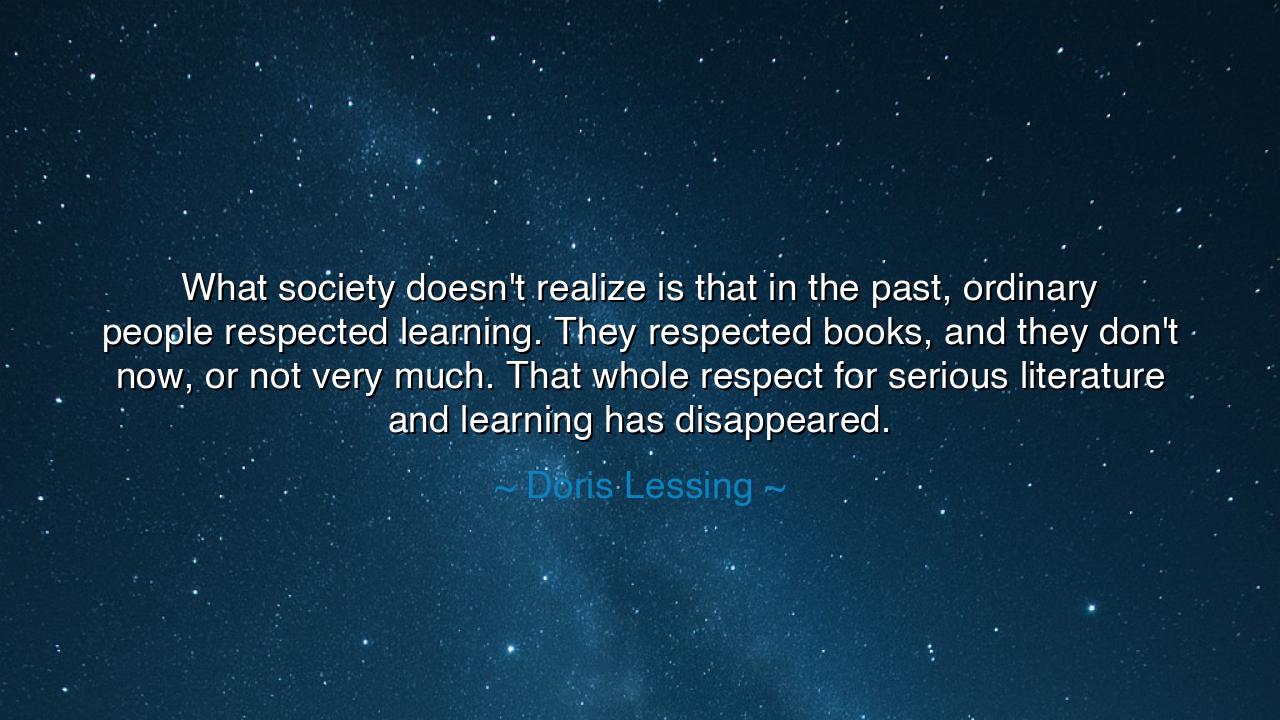
What society doesn't realize is that in the past, ordinary people
What society doesn't realize is that in the past, ordinary people respected learning. They respected books, and they don't now, or not very much. That whole respect for serious literature and learning has disappeared.






In the lament of Doris Lessing, there echoes a cry that reaches across the centuries—a cry for the lost reverence of the mind, the fading sanctity of books, and the vanishing glory of learning. “What society doesn’t realize is that in the past, ordinary people respected learning. They respected books, and they don’t now, or not very much. That whole respect for serious literature and learning has disappeared.” These words are not merely an observation; they are a mourning for something sacred, something once held dear—the flame of wisdom that once burned in the hearts of even the humblest souls.
In ages long past, when the world was lit by candlelight and knowledge was a treasure few could touch, men and women looked upon a book as a miracle. A volume of wisdom was not merely paper and ink—it was a vessel of spirit, a voice of the dead speaking to the living. The farmer would bow his head before the schoolmaster; the mother would send her son to study with tears of pride; the village would honor the teacher as one touched by the divine. For they knew that learning was light, and to seek knowledge was to reach toward eternity. But now, in the age of abundance, where words flow like water and truth lies buried beneath noise, the sacred has been made common, and reverence has withered like a forgotten scroll.
Consider the story of Socrates, the wise man of Athens, who taught in the open air, barefoot and poor, yet richer than kings in wisdom. The people gathered around him, for they respected learning as one respects the flame that guides through darkness. He asked questions, he listened, he awakened minds. Yet in the end, the city turned against him, weary of his truth. They forced him to drink poison, and thus he died—but his spirit lived on, kept alive through the books of Plato, the reverence of disciples, the undying hunger for knowledge. It was not power that made his words endure; it was the respect that others held for his wisdom. Without that reverence, even the greatest mind would have been lost to time.
In our age, Lessing warns, this reverence wanes. We live among machines that speak louder than teachers, among screens that dazzle but rarely enlighten. Serious literature—that ancient mirror of the soul—is drowned beneath tides of distraction. The written word, once a sacred covenant between thought and truth, is now too often consumed without reflection. The ordinary people, who once found dignity in learning, now turn away, not because they have no mind, but because the world teaches them that the trivial is more urgent than the profound. This is not progress, but amnesia—a forgetting of what makes humanity noble.
Yet all is not lost. The flame may flicker, but it is not extinguished. Across the world, there are still those who kneel before the temple of thought—teachers who labor for little reward, readers who lose themselves in silence, souls who still believe that wisdom is not a luxury but a calling. Every time a young mind opens a book and feels wonder instead of boredom, every time a reader lingers upon a sentence until it becomes part of their heart, the old reverence breathes again. It is up to each generation to restore respect for learning, not through command, but through example—by living as those who honor the life of the mind.
Let us then remember that to read deeply is an act of devotion, not convenience. To study the words of those who came before is to join a conversation that has endured since the dawn of thought. The ancients called it the “chain of wisdom,” passed from master to student, from scribe to scholar, from one soul seeking truth to another. If we let that chain break—if we cease to value serious learning—then we sever ourselves from the very roots of civilization.
So, O seeker of understanding, take this to heart: cherish the written word as you would a sacred relic. Read not to pass time, but to touch eternity. When others mock seriousness, stand firm in reverence. When the world turns its eyes from wisdom, lift your own toward it. Books are not old things—they are living spirits, whispering to those who will listen. If society forgets this, let it not be forgotten by you. For the torch of learning may dim, but it will never die—so long as there remains one soul who respects it enough to keep it burning.






AAdministratorAdministrator
Welcome, honored guests. Please leave a comment, we will respond soon